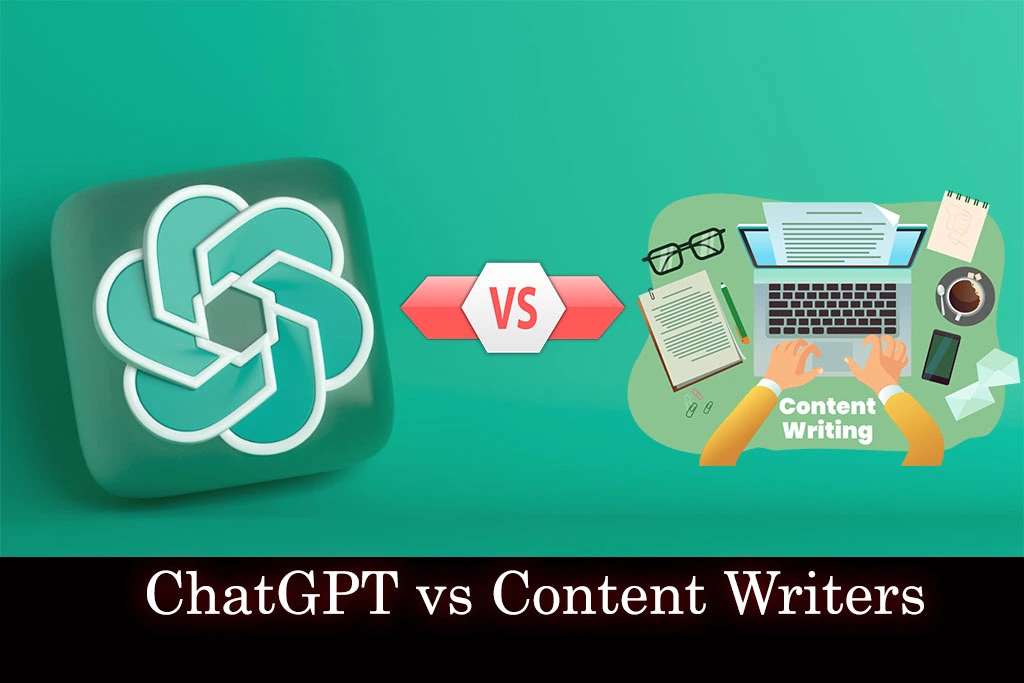In today’s digital world, businesses and individuals alike are constantly looking for ways to produce high-quality content that engages their audience and generates results. One option that has gained popularity in recent years is the use of chatbots and AI language models like ChatGPT, which can create content that mimics human writing. However, some still prefer the more traditional approach of hiring content writers. In this article, we’ll compare ChatGPT with content writers to help you decide which option is best for your needs.
Speed and Efficiency
One of the biggest advantages of using ChatGPT is its ability to generate content at a lightning-fast speed. With its advanced algorithms and machine learning capabilities, ChatGPT can create content in a matter of seconds or minutes. This is a huge advantage for businesses that need to produce large volumes of content quickly.
On the other hand, content writers typically require more time to produce high-quality content. They must conduct research, brainstorm ideas, and carefully craft each sentence and paragraph. While this approach may take longer, it can also result in more polished and nuanced writing.
Quality and Originality
While ChatGPT is known for its speed and efficiency, some argue that its content lacks the originality and creativity of human writing. Since it is a machine learning model, it relies heavily on patterns and data to create content. While it can produce grammatically correct and coherent text, it may not always capture the nuance and style that a human writer can provide.
In contrast, content writers have the ability to infuse their own personality, tone, and voice into their writing. They can create content that is unique and tailored to the brand or individual they are writing for. Additionally, content writers can conduct in-depth research and interviews to ensure that their writing is accurate and informed.
Cost
Another factor to consider is cost. ChatGPT models can be expensive to train and maintain, which means that using them for content creation may not be feasible for smaller businesses or individuals.
Content writers, on the other hand, can offer more affordable options for those on a budget. There are many talented freelance writers and writing agencies that offer competitive rates for high-quality content.
Flexibility and Adaptability
Finally, it’s important to consider the flexibility and adaptability of each option. ChatGPT models can be trained to specialize in specific niches or industries, which means they can quickly adapt to new topics and subject matter. This makes them a great option for businesses that need to produce content on a wide range of topics.
However, content writers may offer more flexibility in terms of style and tone. They can adapt their writing to match the needs and preferences of the client, which can be especially important for businesses with a unique brand voice.
Scalability
ChatGPT can offer scalability advantages for businesses that require large volumes of content on a regular basis. Once the model is trained, it can produce a nearly unlimited amount of content, which means that businesses can easily scale their content creation efforts without worrying about hiring more writers. This can be especially useful for businesses that are growing rapidly and need to produce content quickly.
Content writers, on the other hand, may be limited by their capacity and availability. They may have a limited number of hours per day or week that they can dedicate to writing, which means that they may not be able to produce as much content as a ChatGPT model.
Consistency
Another advantage of using ChatGPT is that it can produce consistent content across different topics and styles. Since it relies on algorithms and data to generate content, it can ensure that the tone and style remain consistent throughout different pieces of content. This can be important for businesses that have a specific brand voice or style that they want to maintain.
Content writers, on the other hand, may have varying levels of skill and experience, which can lead to inconsistencies in the quality and style of their writing. It may be more difficult to ensure that all content produced by different writers remains consistent.
Collaboration
ChatGPT models are not currently designed to collaborate with other writers or team members. They are typically used as a standalone tool for content creation. This means that businesses that require collaboration or input from multiple team members may not find ChatGPT to be the best option.
Content writers, on the other hand, can work with other writers, editors, and team members to produce high-quality content. They can collaborate on different projects and ensure that the final product meets the needs of the business or individual.
Creative Solutions
While ChatGPT models can generate content quickly and efficiently, they may not be able to offer creative solutions to complex problems. They rely heavily on data and patterns, which means that they may not be able to provide unique perspectives or ideas that a human writer could offer.
Content writers, on the other hand, can use their creativity and critical thinking skills to come up with innovative solutions to complex problems. They can brainstorm ideas, conduct interviews, and research to provide unique perspectives that may not be possible with a ChatGPT model.
Cost
One of the most significant advantages of using ChatGPT is the potential cost savings. Hiring content writers can be expensive, especially if you need to produce a large volume of content on a regular basis. In contrast, ChatGPT may be a more cost-effective option since it can generate content quickly and efficiently without the need for ongoing payments to writers.
However, it’s important to note that the cost of training and maintaining a ChatGPT model can be high. Businesses may need to invest in computing resources, training data, and ongoing maintenance to ensure that the model remains accurate and effective.
Quality
While ChatGPT can produce a high volume of content quickly, the quality may not always be as high as content produced by a skilled writer. ChatGPT is designed to mimic human language patterns, but it may not always be able to capture the nuances and subtleties of language that a human writer could.
Content writers, on the other hand, are trained to write high-quality content that is tailored to the needs of the business or individual. They can use their writing skills to create engaging, informative content that is optimized for search engines and social media.
SEO
Search engine optimization (SEO) is an important consideration for businesses that want to drive traffic to their website. While ChatGPT can generate content that is optimized for search engines, it may not be as effective as content written by a skilled writer who understands SEO best practices.
Content writers can use their knowledge of SEO to create content that is optimized for specific keywords and phrases. They can also ensure that the content is structured in a way that is easy for search engines to crawl and index.
Trustworthiness
Finally, it’s important to consider the trustworthiness of the content being produced. While ChatGPT can generate content quickly and efficiently, it may not always be accurate or reliable. It’s possible for the model to generate false or misleading information, which can be damaging to the reputation of the business.
Content writers, on the other hand, can ensure that the content is accurate, reliable, and trustworthy. They can conduct research, cite sources, and fact-check information to ensure that the content is of high quality and provides value to the reader.
Conclusion:
In conclusion, both ChatGPT and content writers have their own unique strengths and weaknesses. When deciding which option to choose, it’s important to consider factors such as scalability, consistency, collaboration, creativity, cost, quality, SEO, and trustworthiness. Ultimately, the choice will depend on your specific needs and priorities, as well as the resources available to your business.
Recommendations
frequently asked questions (FAQs) about ChatGPT vs content writers:
Q. Can ChatGPT replace human content writers completely?
While ChatGPT can generate content quickly and efficiently, it may not be able to replace human content writers completely. The model is still limited by its reliance on data and algorithms, and may not always be able to provide the same level of creativity, critical thinking, and quality as a skilled human writer.
Q. What types of content are best suited for ChatGPT?
ChatGPT is best suited for content that is straightforward and requires little to no creative input, such as product descriptions, news articles, and basic blog posts. It may not be as effective for content that requires a unique perspective, creative thinking, or extensive research.
Q. What are the benefits of hiring a content writer over using ChatGPT?
Hiring a content writer can offer several benefits, including the ability to produce high-quality, original content that is tailored to the needs of the business or individual. Content writers can also provide valuable insights and ideas, collaborate with other team members, and ensure that the content is trustworthy and reliable.
Q. How much does ChatGPT cost compared to hiring a content writer?
The cost of using ChatGPT vs hiring a content writer can vary depending on several factors, including the volume of content needed, the complexity of the content, and the quality of the writing. While ChatGPT may be more cost-effective for producing large volumes of straightforward content, hiring a content writer may be a better investment for high-quality, original content that requires creativity, critical thinking, and collaboration.
Q. Is ChatGPT capable of producing content in multiple languages?
Yes, ChatGPT can be trained to generate content in multiple languages. However, the quality and accuracy of the content may vary depending on the language and the quality of the training data used to train the model. It’s important to ensure that the model is trained on high-quality data in the desired language to ensure the best results.
Q. Is it possible to customize the output of ChatGPT to match my brand’s voice and tone?
Yes, it’s possible to customize the output of ChatGPT to match your brand’s voice and tone. You can fine-tune the model by providing it with samples of your brand’s content, and adjusting the parameters of the model to generate content that matches your brand’s style and tone.
Q. How accurate is ChatGPT compared to human content writers?
The accuracy of ChatGPT compared to human content writers can vary depending on the specific use case and the quality of the training data. In some cases, ChatGPT may be able to produce content that is just as accurate as a human writer, while in other cases, the content may be less accurate or require more editing and refinement.
Q. Is ChatGPT suitable for producing technical or specialized content?
While ChatGPT can be trained to generate content in a wide variety of domains, it may not be the best option for producing technical or specialized content. This type of content often requires a deep understanding of the subject matter, and may require specialized knowledge that is not present in the training data used to train the model.
Q. Can ChatGPT generate content in real-time?
Yes, ChatGPT can generate content in real-time, which can be useful for chatbots or other applications that require quick responses to user input. However, it’s important to ensure that the model is trained on a large enough dataset to generate accurate and relevant responses in real-time.
Q. What are the ethical considerations of using ChatGPT for content production?
Using ChatGPT for content production raises several ethical considerations, such as the potential for the model to produce biased or misleading content, the impact on employment in the content writing industry, and the potential for the technology to be used to spread misinformation or propaganda. It’s important to consider these ethical implications and to use the technology responsibly and ethically.











